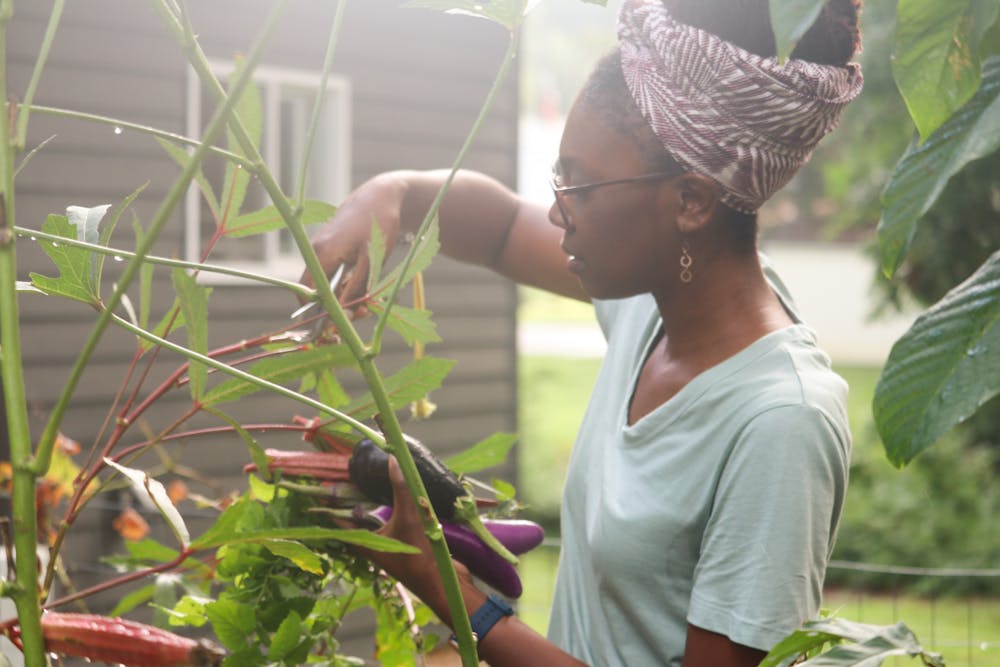Ashlie Thomas is planting a seed in the Graham community.
After moving from South Carolina four years ago, Thomas said she began to realize that diverse food options were limited in Graham compared to surrounding cities like Greensboro, Chapel Hill and Durham. Now, she’s using her love for nature to find her niche here in Alamance County.
Thomas grows over 80 different herbs and over 40 different fruits and vegetables in her garden. It’s a Certified Natural Habitat, which she got approved through the National Wildlife Federation. She’s currently preparing for the fall growing season by planting vegetables like broccoli, collard greens and beets. Thomas grows year round in her garden and said she’s always busy. Fall is her favorite growing season because it’s minimal effort for a big harvest.
“We're growing all of those things, those cruciferous vegetables that are really good in soups and as side dishes or even wraps,” Thomas said. “So there's a lot of versatility for the produce that will be growing in the fall and in the winter.”
Thomas said there’s a misconception to gardening in the fall because people assume everything dies as temperatures drop.
“You can actually get quite a few things that typically just slip under the radar,” Thomas said. “We don't realize that during the fall and the winter, especially in our climate, they grow the best during that time.”
As she prepares for the fall, she plans to give back and deepen her connections with organizations in the area. Thomas is a graduate student at North Carolina A&T State University studying food and nutritional sciences. Her research focuses on implementing strategies to address food insecurity. Thomas said the issue isn’t “one size fits all,” and gardening addresses finding secure food on a very individual level.
“Gardening can not only provide greater access to some of these more nutrient-dense foods, but it also helps to indirectly teach us about what's out there, what can I eat, and we're more inclined to actually try these things,” Thomas said. “I believe that community gardens, backyard gardens, even just the act of trying to grow your own food or learning how to grow your own food, can help to push the bar just a bit toward perhaps creating a bit more access for people.”
One of the organizations Thomas is working with is Benevolence Farm. She serves on the board of directors and frequently works with Kristen Powers, the executive director of the non-profit organization. Powers said they’ve been fortunate to work with Thomas because of her expertise with food access, health and nutrition, and her large Instagram following is a great tool for communicating and teaching that information.
“She's been able to transfer the skills she's learned through that effort, combining our education platform on Instagram with her gardening, to transfer to Benevolence and how we better share stories or better share what's going on at our farm, especially given the community we work with,” Powers said. “So that's been a really neat mutual learning experience and she's very good at partnerships, very good at community building.”
Powers said food can be an easy thing to take for granted when people have access to it all the time. Her organization is all about helping formerly incarcerated women. She said food is not a guarantee for people coming home from jail or prison because they may not have a steady income or they may have been denied government benefits. Powers said the restriction can vary from six months to a lifetime.
“A lot of the general community don't know that it is even a system problem,” Powers said. “I think the scope between Ashlie and her work and Benevolence is work with food. It’s not only how we get food into the hands of people who need it, but how do we also solve the infrastructure problems we have that make it difficult to get that food in the first place?”
Thomas agrees that there’s still systemic changes to make, such as in educating people or providing access to transportation, but gardening is a small step in that direction. But, there’s also steps students can take too. Thomas encourages students to get in touch with their community gardens and overcome the stigma around getting food from a food pantry or bank.
“Food is food. Food should be available for everyone, food should be accessible for everyone,” Thomas said. “As a matter of fact, normalize going with your friends to get the foods that you need. Even for friends that may not have access to food as well. So tap into those resources if you can, and remember, this is completely normal.”
Elon freshman Abigail Wiatrek is a volunteer through the Kernodle Center for Civic Life and said Campus Kitchen and Loy Farm are both beginning some of their first cooking and volunteer shifts this week. She said volunteering through these organizations can help meet the needs of both the Elon and surrounding communities.
“It leads to a lot of really good engagement of understanding where food comes from and the understanding behind the instability that comes with food insecurity and helping address that problem,” Wiatrek said.
For anyone interested in gardening, Thomas suggests starting small with just one plant and growing from there. She said her garden is open to anyone, and it’s a sanctuary for big and small creatures alike. Thomas said she hopes her holistic approach to wellness can bring just as much healing as giving back what comes from it.
“This is a very healing place. It's a place to ground and it's a place to come to the realization of our place in the world,” Thomas said. “That's to love and be compassionate and all of those things.”


